LEARNING PATH
The complete guide to SMS marketing
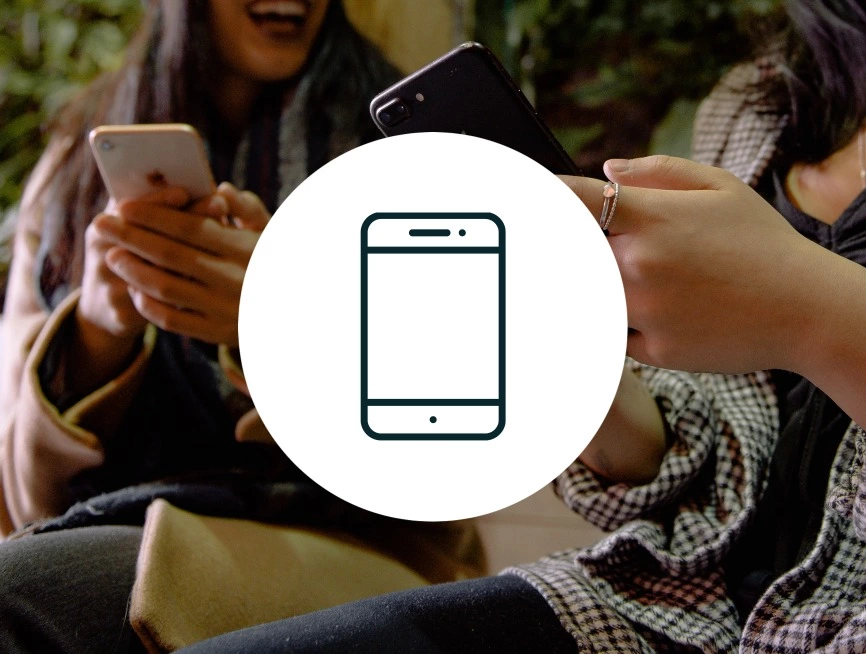
SMS marketing definition
SMS stands for short message service but it’s more commonly known as texting. SMS marketing is the act of a business sending promotional or transactional messages to customers for marketing purposes using text messages.
Key benefits of SMS marketing
Reach customers faster
One of the key benefits of SMS marketing is that you can reach customers faster. Research shows that 60% of consumers check and answer texts within 1-5 minutes of receiving the message. This makes it an ideal channel for time sensitive promotions, such as informing a shopper that a product they were interested in has dropped in price.
Build customer loyalty
SMS marketing is also a great way to build customer loyalty, as it provides another, more intimate, channel to send personalized messages and offers to individuals.
Increase response rates
SMS allows you to reach your customers directly on their mobile devices, helping to increase response rates. Gartner research shows that on average SMS marketing messages have a 45% response rate.
SMS marketing vs email marketing
SMS marketing and email marketing aren’t mutually exclusive, so if you’re considering dipping your toes into the world of SMS as a marketing channel, it doesn’t mean you should shift all your energy from email.
Instead of thinking SMS marketing vs email marketing, think SMS marketing and email marketing. Marketers can achieve faster results and higher order completion rates by sending a mix of email and SMS messages to recover lost revenue, help shoppers stock up on their favorite product and more.
For example, making use of both email and SMS in your cart abandonment programs can lead to higher engagement and recovered revenue. And who doesn’t want that?
A sample cadence could look like:
- SMS 15 minutes after abandonment
- Email 24 hours after abandonment
- SMS 48 hours after abandonment
- Email 7 days after abandonment
SMS marketing best practices
Get opt-in permission
Similarly to email marketing, SMS marketing requires a clear opt-in. One way to do this is to add a phone number field to your data capture forms and ask customers to opt in to text messages, as GolfClubs4Cash does in this example.
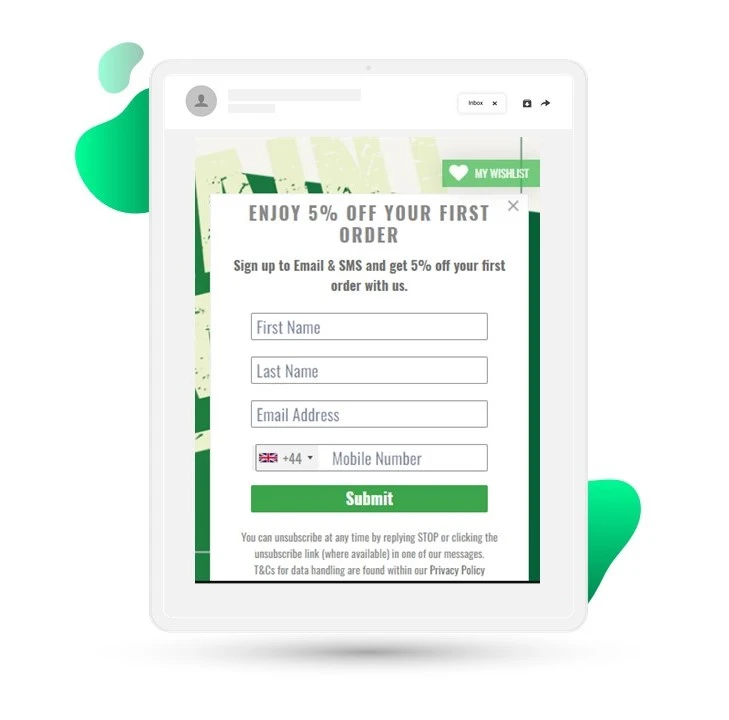
Source: golfclubs4cash.co.uk
Include opt-out instructions
Likewise, it’s important to include clear opt-out instructions in each SMS message you send to ensure that customers can opt out of receiving future messages easily, especially since SMS is a more intimate channel.
Identify yourself
Customers probably won’t have you saved in their phone contacts, which means your messages will appear from a number they don’t recognize. To overcome any confusion, you should identify your business straight away, for example by stating your brand name followed by a colon at the beginning of each message.
Patch Plants ticks off two best practices by stating their brand name at the beginning of the message and including clear opt-out instructions.
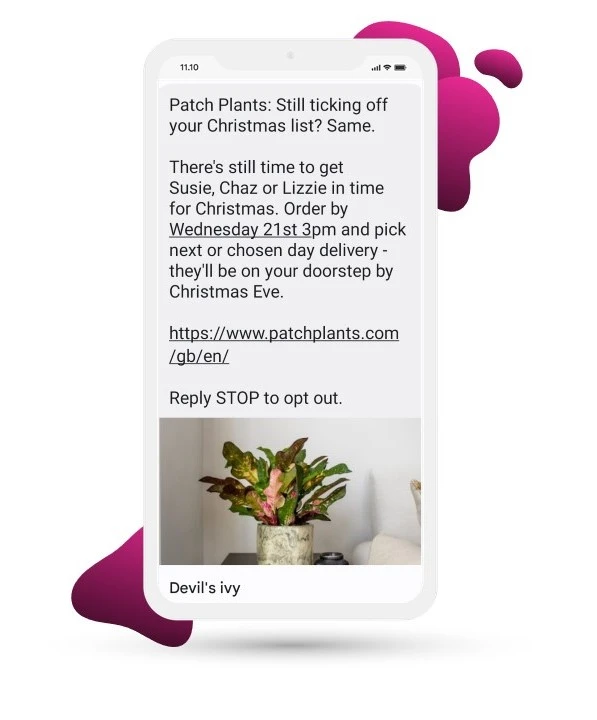
Use personalization
It’s important to stay respectful of the medium. Don’t bombard your customers with messages, and keep messages you do send highly personalized and specific to the individual customer. That way, you can build up trust with your customers and your messages will stand out more.
Increase response rate
Increase response rates by including a CTA in your text messages to encourage customers to take the next step. For example, you could include a CTA like ‘Reply YES to RSVP’ or ‘click the link to learn more’
SMS marketing automation
At this point, you might be thinking that SMS marketing sounds exciting but you’re never going to be able to fit it into your busy day. That’s where SMS marketing automation comes in.
Automated SMS messages are ones that you’ve pre-written and scheduled in advance to be sent out to specific customers.
The best kind of automated SMS messages are triggered by specific customer behavior, such as cart abandonment and order confirmation. That way, you can engage each shopper with 1:1 personalized messages that are highly relevant and timely.
SMS marketing examples
Cart and browse abandonment
Similarly to cart and browse abandonment emails, SMS messages can be used to remind customers of a product they’ve carted or browsed without purchasing. By adding SMS to your cadence as well as email, you will likely have a higher response rate.
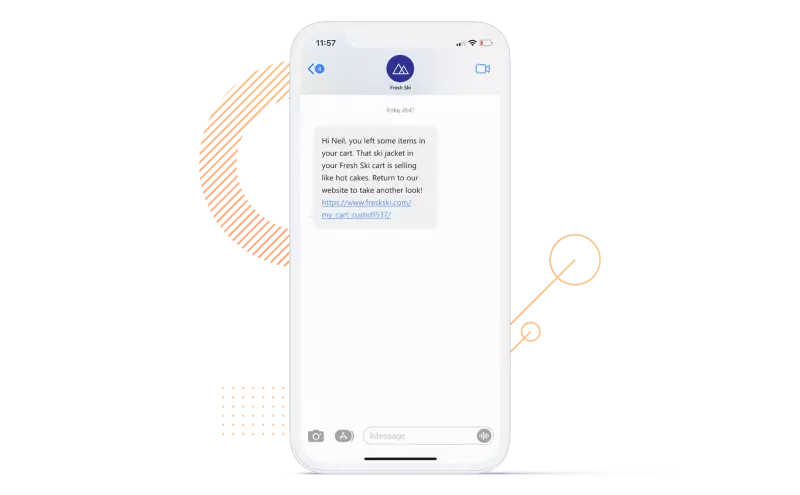
Price drop
If a customer has been spending a lot of time looking at a product but they haven’t bought it yet, they may be more tempted to buy it once it has dropped in price. Sending them a text message to inform them of price drops will encourage them to make the purchase.
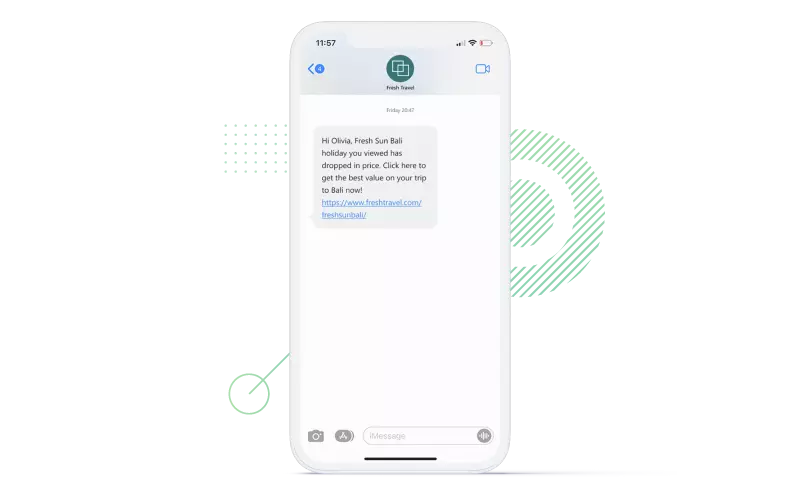
Stock messages
If a customer browsed a product that was out of stock, you can give them the option to share their phone number and set up a triggered SMS message to let them know when the product comes back into stock.
Similarly, you can set up an SMS message to trigger when a hot item they have browsed is low in stock, convincing them that now is the time to buy. This is especially useful if the product is already on their wishlist.
Messages about new stock from their favorite brand or category can also increase chances of purchase.
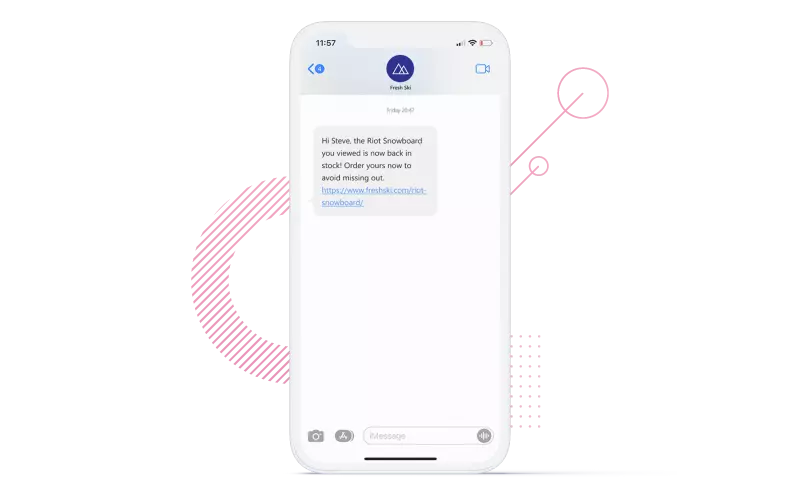
Replenishment
If your products are the type that customers are likely to want to buy again after they run out (such as vitamins or make-up), reminding them to re-order after a certain period of time depending on the lifecycle of the product can be useful for both parties.
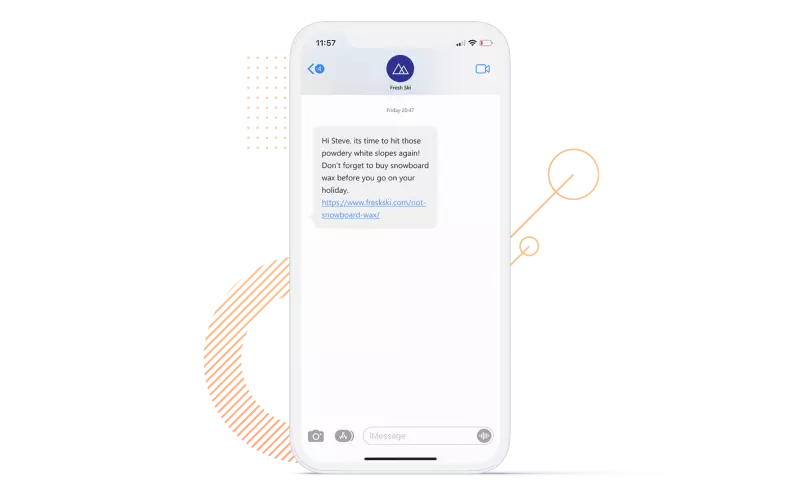
SMS marketing platforms
Fresh Relevance’s SMS Triggers feature empowers marketers to connect directly with consumers at key moments in their customer journey through personalized, contextually relevant SMS campaigns.
With Fresh Relevance’s SMS Triggers, you can:
- Engage shoppers with 1:1 personalized messages, including cart abandonment, browse abandonment and purchase complete, as well as via custom signals, for example for bespoke offers.
- Tailor SMS messages to the customer’s individual behavior and transactional history.
- Build and deploy SMS campaigns and advanced workflows using our intuitive drag-and-drop UI – all without coding or involving your IT team.
- Measure SMS contribution, track ROI and spend budget more effectively with revenue-based reporting.
- Discover the best approach for SMS campaigns for your business with A/B tests.
Send SMS messages throug Fresh Relevance or your existing SMS provider.
Book a demo to learn more about SMS Triggers and how it could help your business.
FAQs
What are the disadvantages of SMS?
The disadvantages of SMS marketing include potential privacy concerns and consent issues, as well as the risk of overwhelming customers with messages. SMS messages can be intrusive if not well-timed and may not be suitable for conveying detailed product information.
What is the best industry for SMS marketing?
The retail industry is ideal for SMS marketing due to its ability to deliver time-sensitive promotions, flash sales, and product updates directly to a customer’s phone. This instant communication aligns with retail’s dynamic and fast-paced nature.
Is SMS marketing the future?
SMS marketing is already being embraced by customers for its direct, concise communication. The future holds potential growth with increased personalization and relevance, but customer consent and privacy will continue to be critical.




